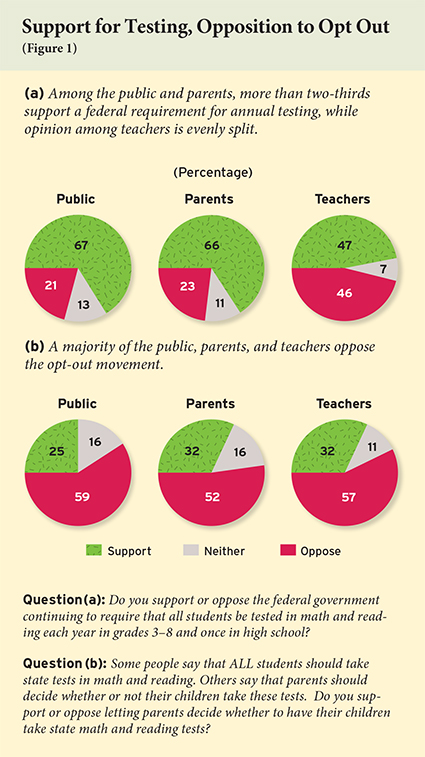
WINTER 2016 / VOL. 16, NO. 1]
A new poll by Education Next suggests that there may be less hostility towards testing than the media would have us believe. The nationally representative survey solicited responses from approximately 4,000 members of the general public, parents and teachers.
When asked: “Do you support or oppose the federal government continuing to require that all students be tested in math and reading each year in grades 3-8 and once in high school?” respondents answered as follows:
Members of the public: 67% supported vs. 21% opposed continuing the federal requirements for annual testing (contained in the federal No Child Left Behind Act)
Parents: 66% supported vs. 23% opposed continuing the federally-mandated testing;
Teachers: 47% supporting vs. 46% opposed continuing the federally mandated testing.
In answer to the question, “Do you support or oppose letting parents decide whether to have their children take state math and reading tests?” The responses were as follows:
Members of the public: 25% supported vs. 59% opposed giving parents the right to “opt-out” of state tests;
Parents: 32% supported vs. 52% opposed giving parents the right to “opt-out” of state testing;
Teachers: 32% supported vs. 57% opposed giving parents the right to “opt-out” of state testing.
While federal and state policymakers may change the type, number and timing of tests students have to take, testing will remain an indispensable part of our education system. Learning List’s independent alignment reports help educators understand how the instructional materials they use may be affecting their students’ test results. If students repeatedly missed test questions associated with a particular standard or group of standards, teachers can refer to Learning List’s alignment report(s) to determine (1) whether the district’s instructional material(s) is/are aligned to those standards, and (2) more specifically, whether the specific citations (e.g., page numbers, lessons) they assigned are aligned to those standards. If either the material or the citations were not aligned to those standards, students likely did not learn what those standards required them to know. Either situation is easily fixed by providing supplemental materials aligned to those standards or by assigning other citations listed in the publisher’s correlation that have been verified to be aligned to those standards.